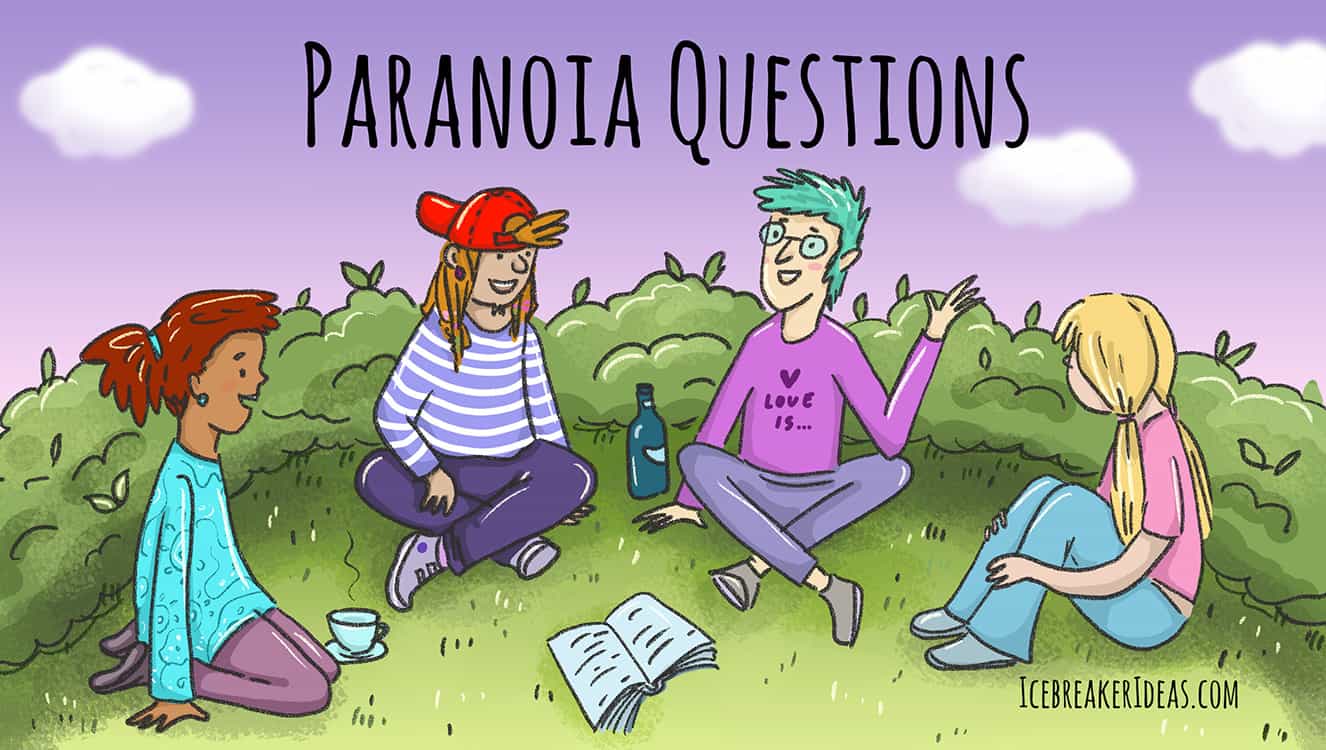101 Questions For Paranoia: Unveiling The Shadows Of Overthinking
Have you ever found yourself stuck in a spiral of "what ifs" and "maybes"? Paranoia can be a sneaky little devil, creeping into your mind when you least expect it. Whether it's doubting someone's intentions or second-guessing your own actions, these intrusive thoughts can really mess with your head. So, buckle up because we're diving deep into the world of paranoia and exploring the questions that fuel it.
Now, don't get me wrong—paranoia isn't always about being overly suspicious. Sometimes, it's just your brain trying to protect you from potential threats, real or imagined. But when it starts taking over your life, it's time to take a step back and ask yourself some tough questions. This is where our list of 101 questions for paranoia comes in handy.
We'll break it down into bite-sized chunks, covering everything from understanding paranoia to practical strategies for managing those pesky overthinking patterns. So, whether you're dealing with trust issues, relationship paranoia, or just plain old anxiety, this article has got your back. Let's get to it!
Read also:Aj Cook Measurements A Comprehensive Look At The Stars Vital Stats And Beyond
Table of Contents
- What is Paranoia?
- Biography of Paranoia
- Common Symptoms of Paranoia
- Questions About Trust Issues
- Relationship Paranoia Questions
- Questions for Self-Doubt
- Mental Health and Paranoia
- Workplace Paranoia Questions
- Managing Paranoia
- Conclusion
What is Paranoia?
Let's start with the basics. Paranoia is like that little voice in your head that never stops questioning everything. It's a psychological condition where you feel like people are out to get you, or you're constantly doubting their motives. But here's the kicker—it's not always based on reality. Sometimes, it's just your brain playing tricks on you.
So, why does paranoia happen? Well, it could be due to a mix of genetic, environmental, and psychological factors. Stress, trauma, and even certain medications can trigger those paranoid thoughts. And let's not forget about social media—it's a breeding ground for comparison and self-doubt.
Now, before we dive into the questions, let's take a moment to understand the different types of paranoia. There's the everyday kind, where you might think your friend is mad at you because they didn't text back right away. Then there's the more severe form, which can be a symptom of mental health conditions like schizophrenia or bipolar disorder.
Biography of Paranoia
Paranoia has been around for centuries, but it wasn't always recognized as a mental health issue. Back in the day, people thought it was just a sign of weakness or moral failure. Thankfully, we've come a long way in understanding it better.
Here's a quick breakdown of paranoia's "life story":
| Year | Event |
|---|---|
| 1800s | First documented in medical literature |
| 1900s | Recognized as a symptom of mental illness |
| 2000s | Included in DSM-5 as a diagnostic criterion |
As you can see, paranoia has evolved over time, and so has our understanding of it. Now, let's move on to some common symptoms.
Read also:Twin Ethnicity Trends A Fascinating Dive Into The Rise Of Mixed Heritage Twins
Common Symptoms of Paranoia
Alright, so how do you know if you're dealing with paranoia? Here are a few red flags to watch out for:
- Constantly questioning people's motives
- Feeling like you're being watched or followed
- Struggling to trust others
- Overanalyzing every little detail
- Having difficulty relaxing
These symptoms can vary in intensity, but if they're starting to affect your daily life, it's time to take action. And that's where our list of questions comes in.
Questions About Trust Issues
Trust is the foundation of any relationship, whether it's personal or professional. But when paranoia gets involved, trust becomes a slippery slope. Here are some questions to help you navigate those tricky waters:
Why Can't I Trust People?
This is a big one. If you're constantly wondering why you can't trust others, it might be worth exploring your past experiences. Did someone betray you in the past? Or are you just naturally skeptical?
Am I Being Too Suspicious?
It's normal to have doubts, but if you're always on high alert, it might be time to reassess. Ask yourself: Is there any evidence to support my suspicions? Or am I just letting my imagination run wild?
How Can I Build Trust Again?
Building trust takes time and effort. Start by setting small goals, like trusting someone with a minor task. Gradually work your way up to bigger things, and don't be afraid to communicate your feelings along the way.
Relationship Paranoia Questions
Relationships can be a breeding ground for paranoia, especially if you're prone to overthinking. Here are some questions to help you tackle those relationship-related fears:
Is My Partner Cheating on Me?
This one's a doozy. If you're constantly wondering if your partner is being unfaithful, it might be worth having an open and honest conversation. Communication is key in any relationship, so don't be afraid to voice your concerns.
Why Do I Always Doubt My Partner?
Doubting your partner can stem from a lack of self-confidence or past relationship trauma. Take a moment to reflect on your own feelings and see if there's anything you can work on internally.
How Can I Stop Overthinking?
Overthinking is like a hamster wheel in your brain, going round and round with no end in sight. To stop it, try focusing on the present moment. Meditation, journaling, and mindfulness exercises can all help you stay grounded.
Questions for Self-Doubt
Self-doubt is another common side effect of paranoia. Here are some questions to help you boost your confidence and silence those inner critics:
Am I Good Enough?
This is a question we've all asked ourselves at some point. The truth is, you're probably way better than you think. Focus on your strengths and accomplishments, and don't let self-doubt hold you back.
Why Do I Compare Myself to Others?
Comparison is the thief of joy, and social media doesn't help. Instead of comparing yourself to others, try setting your own standards and goals. Celebrate your uniqueness and embrace your individuality.
How Can I Boost My Self-Esteem?
Boosting your self-esteem takes time and effort, but it's totally worth it. Surround yourself with positive influences, practice self-care, and don't be afraid to ask for help when you need it.
Mental Health and Paranoia
Paranoia can be a symptom of various mental health conditions, so it's important to address it properly. Here are some questions to help you understand the connection:
Is Paranoia a Mental Health Disorder?
Not exactly. Paranoia itself isn't a disorder, but it can be a symptom of conditions like schizophrenia, bipolar disorder, and anxiety. If you're experiencing severe paranoia, it's worth consulting a mental health professional.
Can Therapy Help with Paranoia?
Absolutely! Therapy can be a game-changer when it comes to managing paranoia. Cognitive-behavioral therapy (CBT) is particularly effective in helping you reframe negative thoughts and develop healthier coping strategies.
What Medications Are Available?
If paranoia is affecting your daily life, your doctor might prescribe medication to help manage it. Antipsychotics and antidepressants are commonly used, but it's important to work closely with your healthcare provider to find the right treatment plan for you.
Workplace Paranoia Questions
Workplace paranoia can be a real drag, especially if you're constantly worried about your job security or coworker relationships. Here are some questions to help you tackle those work-related fears:
Is My Boss Trying to Fire Me?
If you're constantly worried about losing your job, take a step back and assess the situation. Are there any concrete signs that your position is in jeopardy? Or are you just letting your imagination run wild?
Why Don't My Coworkers Like Me?
Feeling like you don't fit in at work can be tough. Instead of assuming the worst, try building connections with your coworkers. Join team activities, strike up conversations during breaks, and don't be afraid to show your true self.
How Can I Stay Calm at Work?
Staying calm in a high-pressure environment can be challenging, but it's not impossible. Practice deep breathing exercises, take regular breaks, and prioritize self-care outside of work. Your mental health matters, so don't neglect it.
Managing Paranoia
Now that we've covered the questions, let's talk about some practical strategies for managing paranoia. Here are a few tips to help you take control of those intrusive thoughts:
Practice Mindfulness
Mindfulness is all about staying present and aware. By focusing on the here and now, you can reduce the power of those paranoid thoughts. Try meditation apps, yoga, or even simple breathing exercises to stay grounded.
Challenge Negative Thoughts
When a paranoid thought pops into your head, ask yourself: Is there any evidence to support it? If not, challenge it by reframing it in a more positive light. This takes practice, but it can make a big difference over time.
Seek Support
You don't have to face paranoia alone. Reach out to friends, family, or a therapist for support. Sometimes, just talking about your fears can help you gain perspective and feel more in control.
Conclusion
So there you have it—a comprehensive guide to questions for paranoia. Whether you're dealing with trust issues, relationship fears, or workplace anxiety, this article has hopefully provided you with some valuable insights and strategies.
Remember, paranoia doesn't have to rule your life. With the right tools and support, you can learn to manage those intrusive thoughts and take back control. So, don't be afraid to ask for help when you need it, and don't forget to be kind to yourself along the way.
And hey, if you found this article helpful, why not share it with a friend? Or leave a comment below and let us know what you think. Together, we can break the stigma surrounding mental health and create a more understanding world for everyone.


